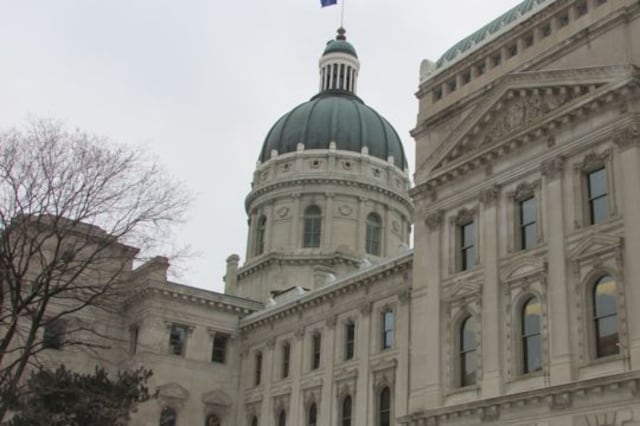Sign up for Chalkbeat Indiana’s free daily newsletter to keep up with Indianapolis Public Schools, Marion County’s township districts, and statewide education news.
Republican lawmakers have advanced a revised version of a property tax reform bill that would reduce the number of property tax revenue sources that school districts would need to share with charters, as proposed in separate legislation.
In addition to tweaking property tax sharing language outlined in Senate Bill 518, the amendment to Senate Bill 1 would also lead to the annexation of the small, mostly virtual Union School Corporation by two neighboring districts.
The amended bill, which the House Ways and Means Committee advanced on Monday with a party-line vote without public testimony, tweaks a previous version of Senate Bill 1 that would have capped property tax growth over the next three years. Instead, the bill would now provide homeowners a credit to apply to property taxes: either 7.5% of their tax liability or $200, whichever is less.
It would also phase in an increase to the supplemental homestead property tax deduction, which would grow to two-thirds of a home’s assessed value in 2031.
The total financial impact that these changes will have on school districts is unclear. But Indianapolis Public Schools said on its website Sunday that it would lose as much as $96 million from 2026 to 2032. A fiscal note for the latest version of the bill was not publicly available as of early Monday afternoon.
Republicans at the hearing before the committee vote said that the move will save homeowners $1.1 billion in property taxes over the next three years, with 55% of homeowners paying less in 2026 than in 2025.
But Democrats decried the lack of information on the fiscal impact of the changes, noting that it will still ultimately burden local governments and school districts.
“We’re in a really big state of unknown right now,” said Rep. Tonya Pfaff, a Democrat. “There’s a lot going on in our United States of America and Indiana, and I think this is just such a big thing to undertake in the current circumstances.”
Districts to share operations fund taxes with charters
The amended version of Senate Bill 1 now would only require districts to share property tax revenue raised for operating expenses with charter schools, eliminating the need to share money districts raise to pay for debt for expenses such as buildings.
Charter schools would have to formally adopt a budget and submit budget information to their authorizers for review under the amended bill. The information would also be posted on the state’s online public information portal.
The bill still phases in the sharing of such operating revenue: Districts would provide 25% of the total amount for charter schools in 2028, growing to 50% in 2029 and 75% in 2030 before reaching the full 100% after that.
Districts would also have to share funds from operating referendums passed and collected starting in 2028. Meanwhile, charter schools that close must return any unexpended property tax revenues to the school district.
Bill would break up Union School Corporation
The amendment also dissolves Union School Corporation, a district in the eastern part of the state that enrolls just a few hundred brick-and-mortar students but thousands of students in its virtual schools. Lawmakers did not explain why they are seeking to break up the district at Monday’s committee meeting.
The district would dissolve on July 1, 2027. The section of the district located in Henry County would become part of the Blue River Valley Schools district, and the section in Randolph County would become part of the Monroe Central School Corporation.
Union School Corporation Superintendent Galen Mast told Chalkbeat he believes lawmakers singled out the district due to its virtual Indiana Digital Learning School, which is run by contract with the for-profit company Stride, Inc.
“We will be fighting this every step of the way,” he said. “If they can do this to Union, who’s next?”
Mast said he believes the change is the start of attempts to force consolidation on smaller schools across the state, and that breaking up Union would help the neighboring districts regain some of the property tax revenue they’d lose in this proposal.
The Union School Corporation would have to use existing assets to pay off any remaining debts. Any funds or assets that remain would then be transferred to Blue River Valley Schools and Monroe Central School Corporation.
Senate Bill 1 now moves to the Indiana House. The legislative session must conclude by April 29.
This story was updated to include comment from the Union School Corporation superintendent.
Amelia Pak-Harvey covers Indianapolis and Lawrence Township schools for Chalkbeat Indiana. Contact Amelia at apak-harvey@chalkbeat.org.






